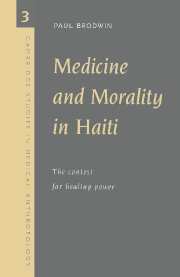Book contents
- Frontmatter
- Contents
- List of illustrations
- List of tables
- Acknowledgments
- Note on transliteration
- Glossary
- Introduction
- 1 The dialectics of healing power
- Part I History and ethnography of biomedicine
- Part II The moral discourse of medical pluralism
- 5 The Catholic practice of healing
- 6 Houngan and the limits to Catholic morality
- 7 Religious healing and the fragmentation of rural life
- 8 Conclusion
- Notes
- Bibliography
- Index
6 - Houngan and the limits to Catholic morality
Published online by Cambridge University Press: 15 December 2009
- Frontmatter
- Contents
- List of illustrations
- List of tables
- Acknowledgments
- Note on transliteration
- Glossary
- Introduction
- 1 The dialectics of healing power
- Part I History and ethnography of biomedicine
- Part II The moral discourse of medical pluralism
- 5 The Catholic practice of healing
- 6 Houngan and the limits to Catholic morality
- 7 Religious healing and the fragmentation of rural life
- 8 Conclusion
- Notes
- Bibliography
- Index
Summary
The dirty houngan: a Catholic perspective
From my very first days in Jeanty, I was eager to begin speaking with houngan and mambo: individuals who call up the spirits and explicitly rely on their healing power. Years of graduate training in anthropology had not suppressed my typically American fascination with the exotic side of popular Haitian religion. Luckily – for both my research and my reputation in the village – my desire was frustrated at every turn. Because of the conventional public disdain for the lwa and those who serve them, people rarely admitted to any knowledge of local houngan. In fact, several months passed before I managed to make contact with houngan who lived nearby, who were willing to speak with me, and who knew the handful of people who helped me throughout my research. I thus had ample time to become familiar with the range of attitudes held by Catholic villagers towards the houngan.
In public, villagers invariably discussed the houngan in terms of the Catholic moral framework presented in the previous chapter. Most villagers insisted that they never visited one or even knew anything about their practice. Often their denials were angry and defensive, as though I had accused them of engaging in criminal activity. Indeed, from the conventional Catholic perspective, any contact with an houngan carries a suspicion of guilt. Houngan are known as specialists in maladi Satan, and consulting them raises the possibility that one either is a “guilty victim” of such a humanly caused illness, or else harbors malicious designs to send a sickness upon someone else.
- Type
- Chapter
- Information
- Medicine and Morality in HaitiThe Contest for Healing Power, pp. 129 - 151Publisher: Cambridge University PressPrint publication year: 1996

